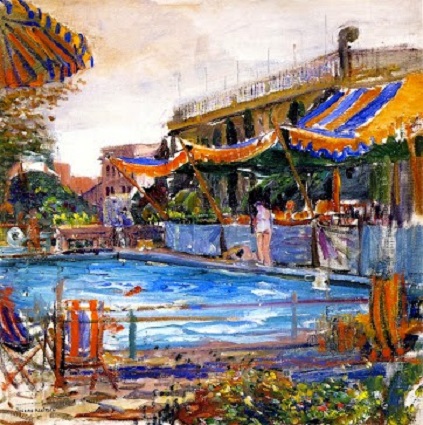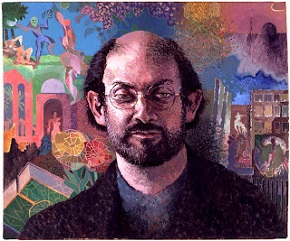|
Dolce far niente

The Ambassador Hotel Swimming Pool door Joseph Kleitsch, jaren 1920
By A Swimming Pool Outside Syracusa
All afternoon I have been struggling
to communicate in Italian
with Roberto and Giuseppe, who have begun
to resemble the two male characters
in my Italian for Beginners,
the ones who are always shopping
or inquiring about the times of trains,
and now I can hardly speak or write English.
I have made important pronouncements
in this remote limestone valley
with its trickle of a river,
stating that it seems hotter
today even than it was yesterday
and that swimming is very good for you,
very beneficial, you might say.
I also posed burning questions
about the hours of the archaeological museum
and the location of the local necropolis.
But now I am alone in the evening light
which has softened the white cliffs,
and I have had a little gin in a glass with ice
which has softened my mood or—
how would you say in English—
has allowed my thoughts to traverse my brain
with greater gentleness, shall we say,
or, to put it less literally,
this drink has extended permission
to my mind to feel—what's the word?—
a friendship with the vast sky
which is very—give me a minute—very blue
but with much great paleness
at this special time of day, or as we say in America, now.

Billy Collins (New York, 22 maart 1941)
New York, Astoria Park Pool. Billy Collins werd geboren in New York
De Indisch-Britse schrijver en essayist Salman Rushdie werd geboren in Bombay op 19 juni 1947. Zie ook alle tags voor Salman Rushdie op dit blog.
Uit: The Enchantress of Florence
“When the prince arrived perspiring from the hard work of galloping around killing animals in the heat of the day, Mohini was at the head of the retinue whose task it was to remove all his clothes and massage his pale skin with scented, cooling oils. Mohini was the one who chose the perfume, sandalwood or musk, patchouli or rose, and Mohini it was who performed the privileged function of massaging his manhood to prepare him for her mistress. Other slaves fanned him and rubbed his hands and feet, but only the Skeleton could touch the royal sex. This was because of her expertise in preparing the unguents necessary for the heightening of sexual desire and the prolongation of sexual congress. She made the pastes of tamarind and cinnabar, or dry ginger and pepper which, when mixed with the honey of a large bee, gave a woman intense pleasure without requiring much exertion from the man, and allowed the man also to experience sensations of warmth and a kind of squeezing palpitation that were extremely pleasurable. She applied the pastes sometimes to her mistress’s vagina, sometimes to the prince’s member, usually to both. The results were held by both parties to be excellent. It was her mastery of the male drugs known as the “ones that made men into horses” that undid her. One day she ordered the castration of a male goat and boiled its testes in milk, after which she salted and peppered them, fried them in ghee, and finally chopped them up into a delicious-tasting mince. This preparation was to be eaten, not rubbed upon the body, and she fed it to the prince on a silver spoon, explaining that it was a medicine that would allow him to make love like a horse, five, ten, or even twenty times without losing his force. In the case of particularly virile young men it could facilitate one hundred consecutive ejaculations. “Delicious,” said the prince, and ate heartily. The next morning he emerged from his mistress’s boudoir, leaving her on the point of death. “Ha! Ha!” he shouted at Mohini on his way out. “That was fun.”
It would be forty-seven days and nights before Lady Man Bai could even think about having sex again, and during that time the prince, when he visited her, was fully understanding of the damage he had wrought, behaved in a manner both contrite and solicitous, and fucked the slaves instead, asking, most often, for the favors of the skinny creature who had endowed him with such superhuman sexual powers. Lady Man Bai could not refuse him but inwardly she raged with jealousy.”

Salman Rushdie (Bombay, 19 juni 1947)
Portret door Thom Phillips, 1992
De Nederlandse dichter en schrijver Sybren Polet (pseudoniem van Sybe Minnema) werd geboren in Kampen op 19 juni 1924. Zie ook alle tags voor Sybren Polet op dit blog.
Waai niet
Waai niet, zeg niet
ik ben er niet; ik heb geen wolken om mee te spelen,
geen acrobaten om uit te beelden.
Je bent de tevreden stemming
die in het gedicht heerst
als ik thuiskom en mijn pygmeeën heb uitgehakt.
Ik kom stoffig thuis uit mijn verleden tijd,
een half humoristische sage
en breng de wind mee
die buigt en zijn hoed afneemt.
Met lippen als volleerde glimlachjes
verwelkom je hem
en je zegt: ik ben zijn huisgenoot, ik buikdanseres,
maar ik waai niet.
Zeg niet, ik ben er niet,
ik heb geen woorden om mee te spelen, geen
vreemde dieren om mij in te kleden.
Je bent de dag die op mij neerstrijkt,
schouderwarm, wanneer de woorden leeg en alle
ledematen
tevergeefs lijken,
en het verleden dat opnieuw gevuld moet worden
met warme pas genezen beelden
vul je met warme pas genezen beelden.
Zo maak je zelfs de groenste uniformen ongedaan.
Zeg niet, ik ben er niet. Want zoals je bent
ben je het hooi van wind dat door mijn haar gaat,
water dat mijn gedachten wast
als er een tijdlijke afwezigheid van zee is,
de onrust van mijn slaap, in mijn slaap zelfs
raak je mij aan. Ik raak je aan,
zo licht
alsof ik een soldaat ben die de zee kust.

Sybren Polet (19 juni 1924 – 19 juli 2015)
Zie voor nog meer schrijvers van de 19e juni ook mijn blog van 19 juni 2016.
19-06-2017 om 18:23
geschreven door Romenu 
Tags:Billy Collins, Salman Rushdie, Sybren Polet, Romenu
|

